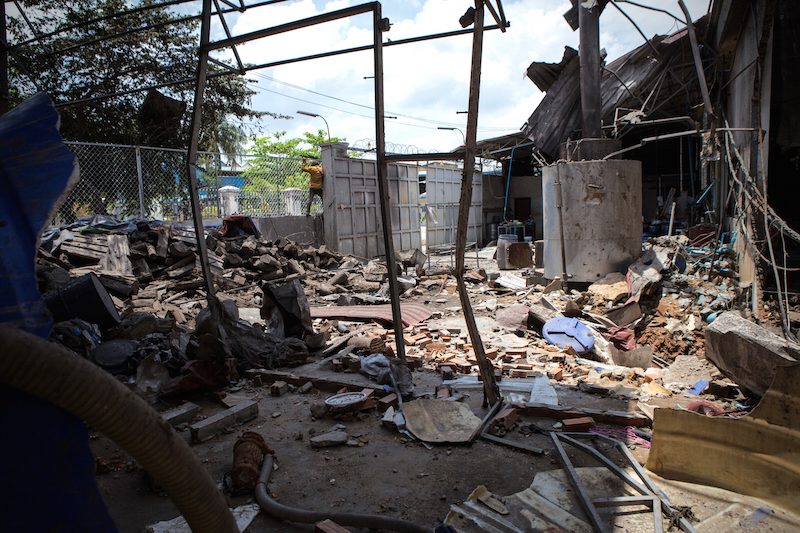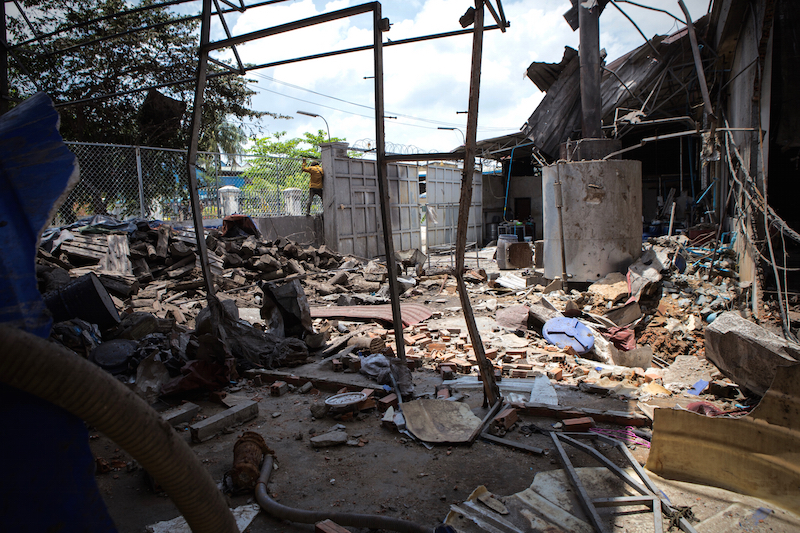A woman speaking for the owners of an unregistered Phnom Penh garment factory where two workers died in an explosion on Saturday said on Wednesday that she had tried to bribe officials who turned up to investigate with money, but they only accepted boxes of soy sauce.
Ly Kheng, whose daughter and son-in-law are the owners of the Sepakam (Handicraft) Chan Sengheng factory, said that the government would not be penalizing the company, out of pity.

“The ministry might not fine [us], because they think this happened accidentally,” she said.
“They know me—I have been doing business for a long time…. They forgave me because I never did bad,” she said, adding that she had tried to offer the visiting officials monetary bribes, but they only accepted boxes of soy sauce.
“They accepted my soy sauce, but they didn’t accept my money because they pitied me as the victim too,” she said.
She did not know whether the officials were from the Industry and Handicrafts Ministry or the Labor Ministry.
Ms. Kheng said the officials who came to see her at her soy sauce production factory, which is located within the same compound as the garment factory in Meanchey district’s Stung Meanchey commune, had absolved her and her children of any responsibility for the explosion.
Soeun Phal, a 27-year-old security guard, and Kong Phanny, a 61-year-old cleaner, died when a wood-fired steam generator at the factory blew up after the guard, who did not know how to operate the machine, was apparently seen adding more wood to the fire.
The victims’ families have both been paid $3,000 in compensation after signing letters agreeing not to file complaints, Ms. Kheng said.
Oum Sotha, spokesman for the Industry and Handicrafts Ministry, whose officials—along with Meanchey district authorities, including deputy district governor Dy Roth Khemarun—visited Ms. Kheng on Monday, could not be reached on Wednesday.
However, on Monday, Mr. Sotha said they would not take “any direct action” against the factory and would only provide recommendations, despite blaming the company—who he said had been operating illegally—for the explosion.
Mr. Sotha said his ministry had never penalized a factory in the past, out of fear of hurting the garment industry.
“As the ministry’s stance, we don’t want to cause difficulties for the private sector,” he said, adding that regularly enforcing certain ministry guidelines—such as checking that factories were following industry standards—would create a “disturbance.”
“We cannot visit frequently. It is not good. It will turn [out] to be a disturbance to the private sector,” he said.
William Conklin, country director for U.S.-based labor rights group Solidarity Center, said the ministry’s attitude was a dangerous one.
“I would say death and grievous bodily harm is even worse for business,” he said.
Neth Mony Ponnaka, director of the Phnom Penh department of industry and handicraft, on Wednesday said new rules for factories using boilers were in the works, and the information would be disseminated after the Khmer New Year holiday, when the department would also train workers in charge of the equipment.
“We are [still] learning what will be in the new guidelines,” he said.
Moeun Tola, executive director of the labor rights group Central, recommended the new guidelines include shorter gaps between boiler inspections by officials and the appointment of at least three to four certified boiler operators per factory.
(Additional reporting by Ouch Sony)




